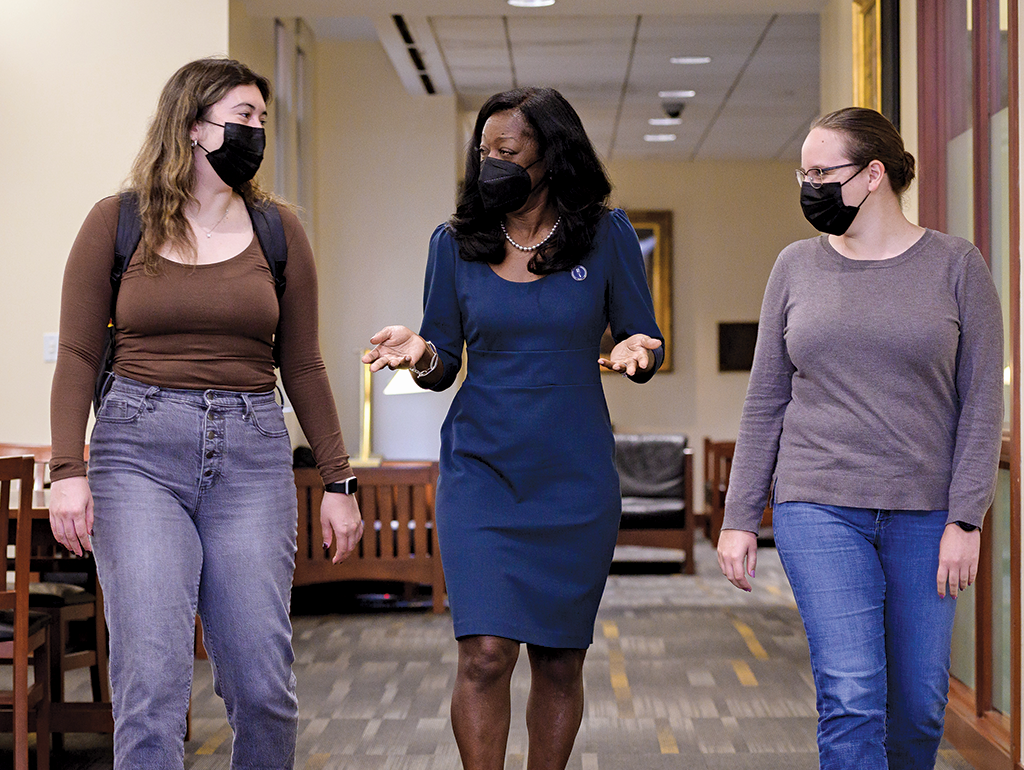By Mary A. Dempsey
Dean Dayna Bowen Matthew, during workday breaks, practices her golf swing behind the closed door of her office. She took up golf when she arrived at GW Law. It was never her sport—she’s a longtime swimmer, runner, and skier—but she doesn’t back away from a challenge.
That resolve isn’t confined to athletics. Entering her second year at the helm of the law school, Dean Matthew is advancing an ambitious three-pronged agenda for the school. Its pillars include ramping up awareness of the school’s extraordinary reputation, boosting funds for professorships and scholarships, and building connections within the GW Law community.

“If I were a law student, this is the perfect law school for me because it has three things. It has a location that marries law with societal impact,” says Dean Matthew, the first woman to lead the school. “It is a place where I could learn to change the world from people who have actually changed the world—faculty members who have worked in the Department of Energy or at the International Court of Justice, for example.
“And it is a law school that is large enough to provide connections to a vibrant network of preeminent GW alumni,” she says.
Dean Matthew took over as dean on Aug. 1, 2020, amid COVID-19 protocols that saw the campus closed and education taking place on virtual platforms. She came into the 2021-22 academic year—when she finally got to meet students and faculty face-to-face—at a run, with a visionary agenda and multimillion-dollar fundraising campaign.
“She has used her first year well,” says Dean’s Advisory Council President Corinne Ball, JD ’78. “She has developed plans. She did outreach to students—this was a record year for applications.”
Among her goals, elevating the school’s reputation may be one of the easiest of her challenges.
“One of the things that is exciting about raising our visibility is that we don’t have to create anything new. All we have to do is just tell the story of what’s going on here,” the dean says.
GW Law, one of the largest law schools in the country, leads in government contract and procurement law. It ranks in the top 10 in intellectual property and technology law, international and comparative law, and environmental and energy law. It is positioned to advance its rising reputation in business and finance law, as well as in national security and cyberspace law. And Dean Matthew sees opportunities in health law and in racial justice scholarship.
“What attracted me to GW, as a veteran of the legal academy, is that I saw something here that I didn’t see at other law schools. Our law faculty is remarkably influential, not only within the legal academy but also outside the academy,” she says.
GW faculty members have had careers in the Civil Rights Division of the U.S. Department of Justice, in the U.S. Department of Labor, in the leadership of the U.S. Patent and Trademark Office, as diplomats, as federal judges, in the military, and as partners in private law firms.
"I would like to see our students able to become public servants without being saddled with debt."
- Dean Matthew

Dean Matthew ticks off the names of faculty members whose work sits at the forefront of current legal issues. Joan Meier, a professor of law and director of the school’s National Family Violence Law Center, serves on the New York State COVID-19 Domestic Violence Task Force. Dawn Nunziato, the William Wallace Kirkpatrick Research Professor and an expert in free speech law, is a member of TikTok’s Content Advisory Council. Sean Murphy, the Manatt/Ahn Professor of International Law, represents nations before the Hague, and Dan Solove, the John Marshall Harlan Research Professor of Law, is the nation’s leading privacy law scholar.
“Professor of Law Spencer Overton is perhaps the country’s leading legal expert in voting rights and campaign finance. He is also the president of the Joint Center for Political and Economic Studies, the nation’s leading Black think tank,” Dean Matthew notes. “He testifies before Congress by day and teaches our students in the same afternoon.
GW Law also boasts some of the most prominent national scholars in administrative and constitutional law such as Dick Pierce and Brad Clark, she adds. “However, it is the fact that our professors are frequently cited by judges and policymakers that distinguishes our great GW Law faculty,” Dean Matthew says. “That’s the caliber of faculty we have. This is a faculty that brings its influence and “real world” connections to the classroom.”
Dean Matthew’s own background reflects her role in pioneering areas of the law. She is a nationally recognized expert in health equity and public health policy and the author of Just Medicine: A Cure for Racial Inequality in American Health Care.
Dean’s Council member Corinne Ball, a partner at Jones Day, applauds the faculty’s expertise but also notes that the median length of faculty service at the school is 25 years. She says one of Dean Matthew’s challenges is to bring in younger faculty to maintain the school’s reputation, attract the best students, and increase GW Law’s global impact.
The dean aspires to raise $42 million over the next few years to attract and retain faculty, to pump up financial aid for students, and to enhance academic programs such as raising the visibility of the business law program and doubling the number of clinical courses for students to gain practical experience before they graduate.
“Right now, GW Law students leave school with $154,000 in debt. That’s too much,” the dean says. “We are the No. 2 part-time program in the United States, and we have nontraditional students who work all day to get a law degree at night. Many of these are students who are committed to public interest law or public service—areas that don’t allow you to discharge student debt quickly.
“I would like to see our students able to become public servants without being saddled with debt,” she adds.
The dean says new scholarship funding is essential if GW Law wants to attract talented students from racially under-represented groups, including African Americans, Native Americans, and Latinx students.
“You will also find that students from rural backgrounds, regardless of race or ethnicity, are likely to need financial assistance in order to come to the nation’s capital. We want all these students to have equal access to a GW Law education,” Dean Matthew says.
The dean says the fundraising effort will reach out to philan- thropic foundations. It will also rely on the school’s 37,000 alumni and the GW Law community-building she plans to do.

"I want to make sure alumni are connected to one another, to their law school, and to the students."
- Dean Matthew
“I want to make sure alumni are connected to one another, to their law school, and to the students. I want to acknowledge how difficult the pandemic period we have just come through has been for our community. It is like bringing a family back together,” she says.
The dean says the school will host both social and official events for students and alumni in the year ahead. She also says staff will be provided with a number of resources, including wellness workshops and counseling.
Going forward, changes in the curriculum are also envisioned. A new associate dean of justice, equity, diversity, and inclusion will be a valued resource in reshaping what is taught. Carmia Caeser, who served as assistant dean of career services at Howard University School of Law, was named to the position this fall.
“Law students often feel invisible in a curriculum that has not been updated to reflect the diversity of our democracy. I went to law school to fight for civil rights. I went to law school to fight for the poor. What about a curriculum that reflects the LGBTQ+ commu- nity and disabled populations?” the dean says. “All over the country, leading law schools are adding race in teaching contract law, they are adding the history of race and the law. They are teaching corporate governance with an eye on the race issues involved. Our faculty has unanimously resolved to do this throughout the GW Law curriculum as well.
“These are ways in which law schools are, in very real terms, the gatekeepers of democracy,” she continues. “I am honored to lead at GW Law, which has served this role longer than any other law school, in the seat of the American democracy.”

